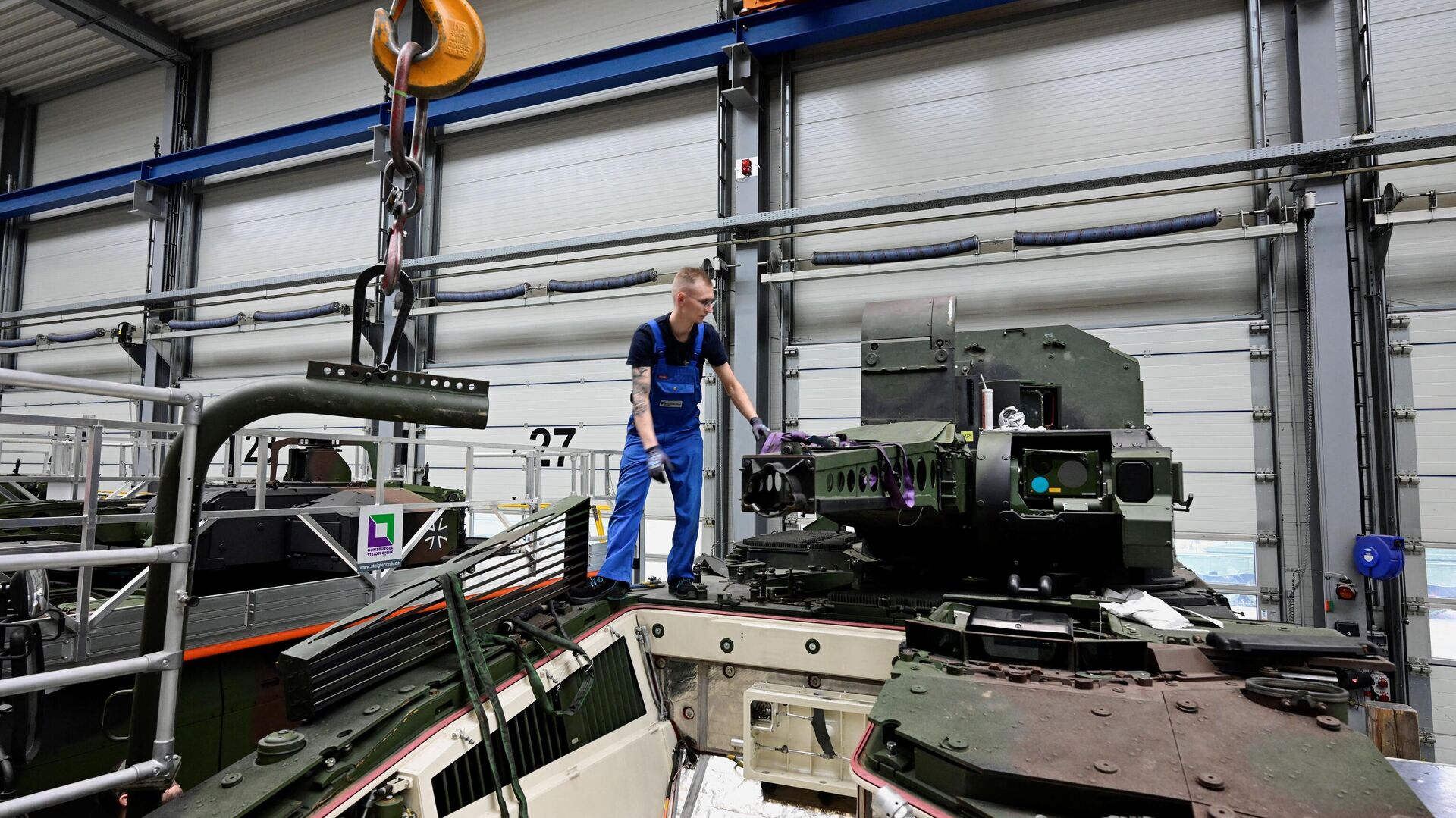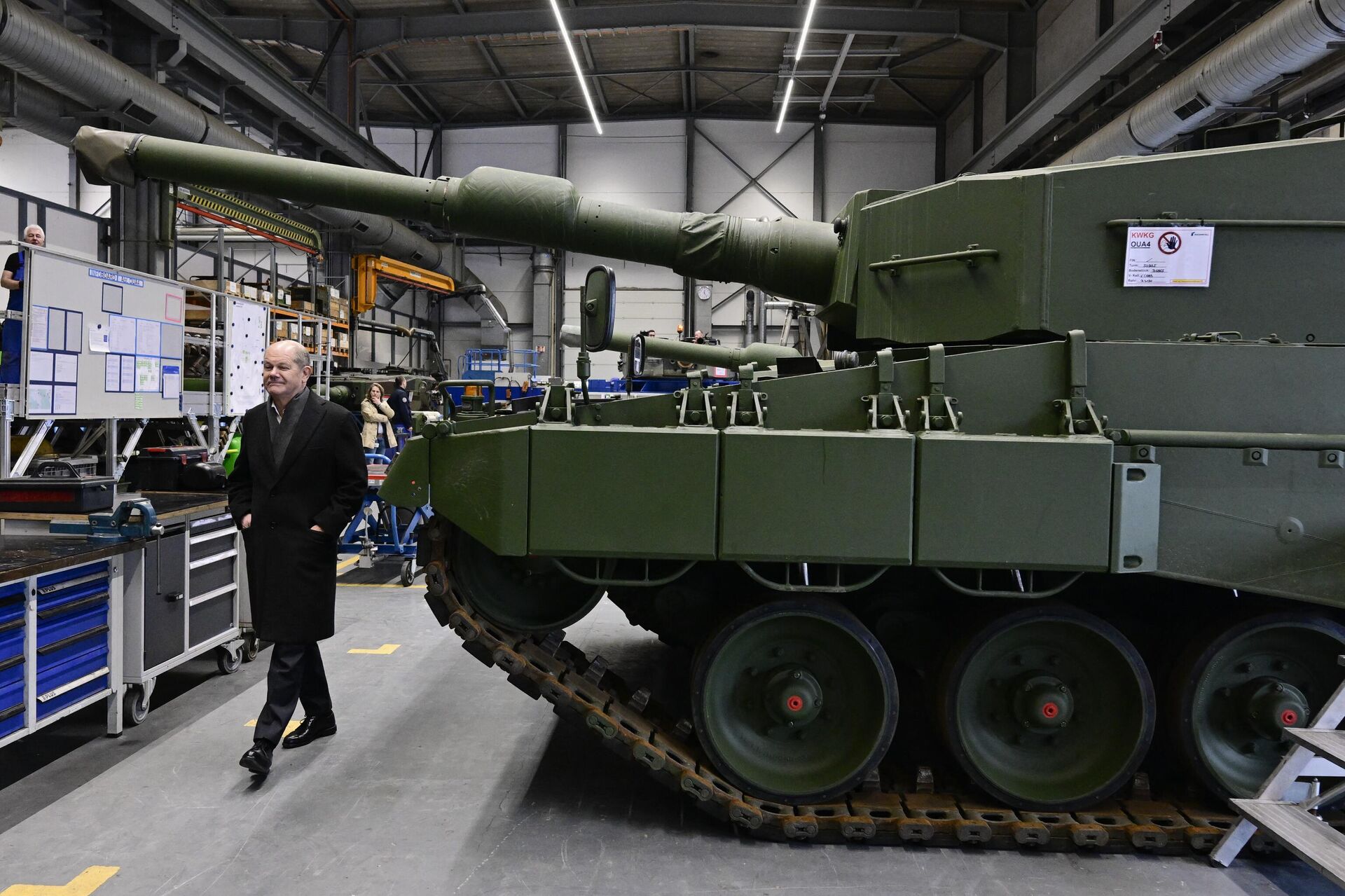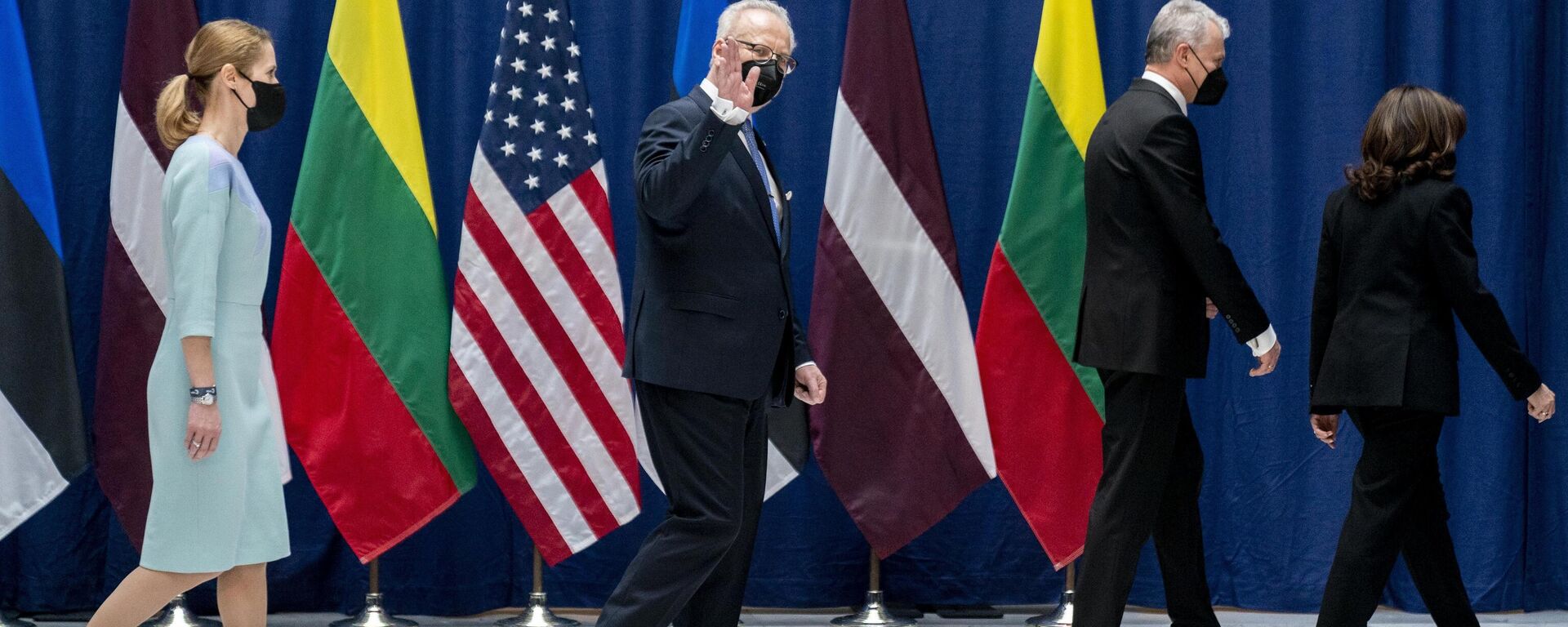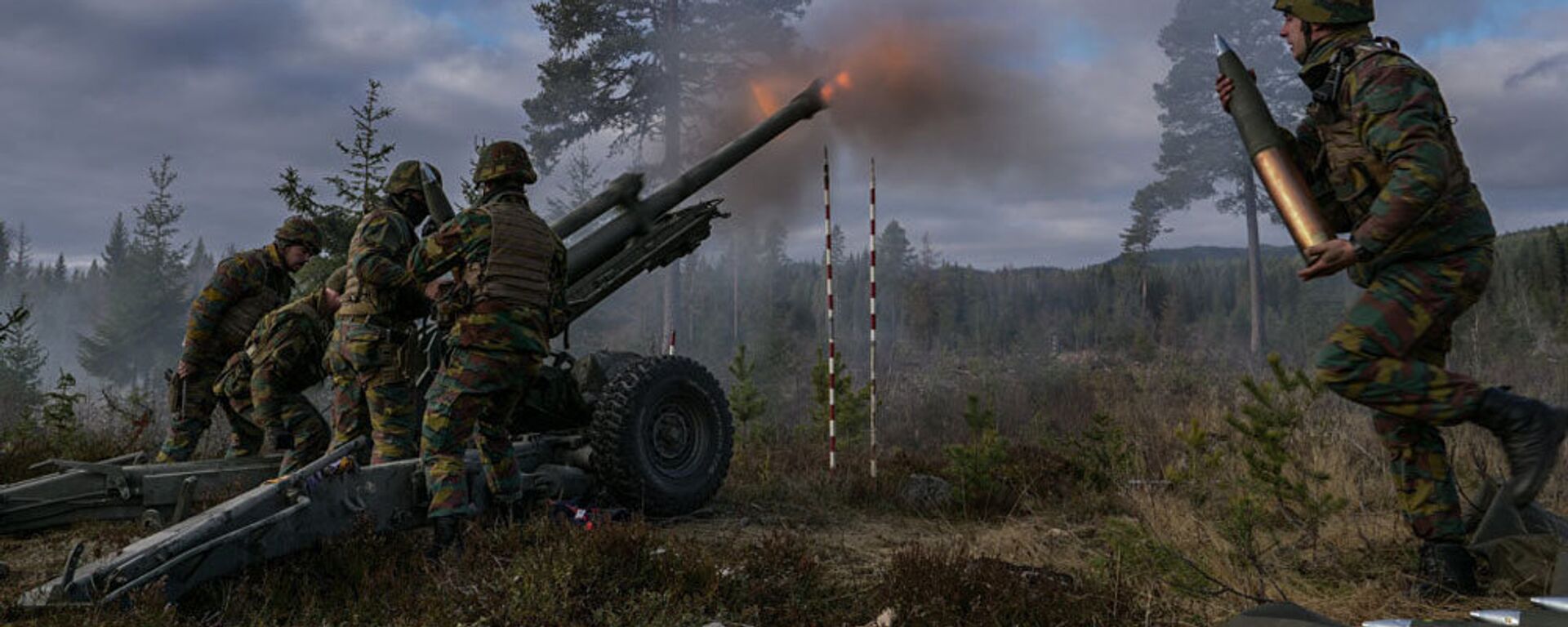https://sputnikglobe.com/20240306/eu-proposes-16-bln-plan-to-prop-up-defense-industry-as-stocks-dwindle-1117160961.html
EU Proposes $1.6 Bln Plan to Prop Up Defense Industry as Stocks Dwindle
EU Proposes $1.6 Bln Plan to Prop Up Defense Industry as Stocks Dwindle
Sputnik International
The EU’s executive branch, the European Commission, has put forward a plan worth around €1.5 billion (U.S. $1.6 billion) to boost defense production on the continent.
2024-03-06T12:05+0000
2024-03-06T12:05+0000
2024-03-06T12:05+0000
world
european commission
european union (eu)
thierry breton
josep borrell
ukraine
margrethe vestager
russia
defense strategy
https://cdn1.img.sputnikglobe.com/img/07e8/03/06/1117160261_0:161:3071:1888_1920x0_80_0_0_aa09a6682287eca0dcbc582a1de8c22e.jpg
The European Union has come up with a strategy on how to give the bloc’s struggling military-industrial sector a much-needed leg up.The funding for stronger EU defense will have to come from the pockets of member states, and procurement outside the bloc was pronounced "no longer sustainable."The EU’s executive branch, the European Commission, has put forward a plan worth around €1.5 billion (US $1.6 billion) to boost defense production on the continent. Scraping together funds to continue military aid to Ukraine without completely leveling their own defense capabilities has been increasingly challenging for the EU, hence the European Defense Industry Program (EDIP), as it has been dubbed. Geared towards stepping up industrial defense capacities, the program’s funding will cover a period from 2025 to 2027.As Brussels outlined the details of the strategy, it trumpeted the need to "stimulate cooperation between the EU and Ukrainian defence industries," regardless of the fact that propping up the neo-Nazi regime was what contributed to the bloc's current predicament.Member states would be required to spend at least 50 percent of their defense procurement budgets within the EU by 2030, and 60 percent by 2035. Furthermore, by 2030, countries would be tasked with collaboratively acquiring at least 40 percent of defense equipment.As an incentive to boost joint procurement by member states in the EU’s defense industry, the program would extend a regulation partially reimbursing joint purchases from the common budget.According to Thierry Breton, the EU commissioner for the internal market, the program will serve until a new long-term budget has been agreed. A presentation of the European Defense Industrial Strategy and European Defense Industry Program (EDIP) took place in Brussels on Tuesday.Joint EU army procurement programs would come with a legal framework guaranteeing everything from favorable funding access to simplified rules, and potential value-added tax waivers. The plan also proposed a fund tailored to unsnarling supply chain bottlenecks in the EU’s defense industry. Plans are already in place to finance industrial sites ready to ramp up arms production, Breton said. The EDIP would also offer measures to allow priority purchasing of civilian and military equipment in the event the European Council declares a supply or security crisis, the EU official added.Those touting the plan in Brussels assured that Ukraine would be able to participate in the joint procurement efforts being mulled.The EU spent €100 billion on defense acquisitions from February 2022 to June 2023, according to the European Commission’s executive vice president, Margrethe Vestager. However, almost 80 percent was spent outside the bloc, with the US accounting for the lion’s share of over 60 percent.The 27 members of the bloc buy weapons individually, with defense companies operating in a fragmented rather than integrated market, Vestager complained.“In the last two years, we have faced the situation of a defense industry without sufficient production capacity to meet the sharp increase of demand. We have been vividly confronted with a well-known structural fragmentation along national borders that limits economies of scale, and creates mistrust, while preventing genuine competition between industrial players. This entails major inefficiencies, and insufficient value for taxpayer’s money,” she said at the Tuesday news conference.Brussels has also been eyeing profits from Russia’s frozen assets as an illegal, but much-coveted, means of plugging in gaping financial holes. However, that is not about to happen. "For this we still need the consent of the EU member states," Josep Borrell, the EU’s high representative for foreign affairs and security policy, said on Tuesday.The new Brussels-proposed defense strategy will put even more strain on EU national budgets, cash-strapped over pressure to pump more money to fund NATO's proxy war with Russia. Western countries are increasingly facing critical shortages of even basic ammunition after giving their stocks away to Ukraine. EU officials earlier admitted that a joint procurement initiative to get one million artillery rounds to Ukraine before the end of March 2024 would not make the deadline.Former Belgian Vice Chief of Defense Marc Thys recently warned German media that European inventories “are extremely low, especially when it comes to high-quality ammunition,” and that “if you order today, for some types of ammunition it will take up to seven years to receive your order.”
https://sputnikglobe.com/20240219/eurobonds-floated-as-eu-grapples-with-ukraine-aid--depleted-weapons-stocks-1116873838.html
https://sputnikglobe.com/20240304/europe-would-be-out-of-ammo-and-throwing-stones-within-hours-of-major-conflict-general-warns-1117127991.html
ukraine
russia
Sputnik International
feedback@sputniknews.com
+74956456601
MIA „Rosiya Segodnya“
2024
News
en_EN
Sputnik International
feedback@sputniknews.com
+74956456601
MIA „Rosiya Segodnya“
Sputnik International
feedback@sputniknews.com
+74956456601
MIA „Rosiya Segodnya“
eu plan to boost defense production, aid for ukraine, depleted weapons stockpiles, us military aid to ukraine, eu aid to kiev, us military stockpiles depleted, eu military stockpiles depleted, did europe give its weapons away to ukraine, did europe leave itself naked sending weapons to ukraine,
eu plan to boost defense production, aid for ukraine, depleted weapons stockpiles, us military aid to ukraine, eu aid to kiev, us military stockpiles depleted, eu military stockpiles depleted, did europe give its weapons away to ukraine, did europe leave itself naked sending weapons to ukraine,
EU Proposes $1.6 Bln Plan to Prop Up Defense Industry as Stocks Dwindle
As the ongoing NATO proxy war against Russia continues to bleed the stockpiles of Kiev’s patrons dry, and Ukraine aid remains stalled in the US Congress, the European Union has been fixated on how to continue fueling the conflict while kick-starting its own defense industry.
The European Union has come up with a strategy on how to give the bloc’s
struggling military-industrial sector a much-needed leg up.
The funding for stronger EU defense will have to come from the pockets of member states, and procurement outside the bloc was pronounced "no longer sustainable."
The EU’s executive branch, the European Commission, has put forward a plan worth around €1.5 billion (US $1.6 billion) to boost defense production on the continent.
Scraping together funds to continue
military aid to Ukraine without completely leveling their own defense capabilities has been increasingly challenging for the EU, hence the
European Defense Industry Program (EDIP), as it has been dubbed. Geared towards stepping up industrial defense capacities, the program’s funding will cover a period from 2025 to 2027.
As Brussels outlined the details of the strategy, it trumpeted the need to "
stimulate cooperation between the EU and Ukrainian defence industries," regardless of the fact that propping up the neo-Nazi regime was what contributed to the
bloc's current predicament.
Member states would be required to spend at least 50 percent of their defense procurement budgets within the EU by 2030, and 60 percent by 2035. Furthermore, by 2030, countries would be tasked with collaboratively acquiring at least 40 percent of defense equipment.
As an incentive to boost joint procurement by member states in the EU’s defense industry, the program would extend a regulation partially reimbursing joint purchases from the common budget.
According to Thierry Breton, the EU commissioner for the internal market, the program will serve until a new long-term budget has been agreed.
A presentation of the European Defense Industrial Strategy and European Defense Industry Program (EDIP) took place in Brussels on Tuesday.
Joint EU army procurement programs would come with a legal framework guaranteeing everything from favorable funding access to simplified rules, and potential value-added tax waivers. The plan also proposed a fund tailored to unsnarling supply chain bottlenecks in the EU’s defense industry. Plans are already in place to finance industrial sites ready to ramp up arms production, Breton said. The EDIP would also offer measures to allow priority purchasing of civilian and military equipment in the event the European Council declares a supply or security crisis, the EU official added.
Those touting the plan in Brussels assured that Ukraine would be able to participate in the joint procurement efforts being mulled.
The EU spent €100 billion on defense acquisitions from February 2022 to June 2023, according to the European Commission’s executive vice president, Margrethe Vestager. However, almost 80 percent was spent outside the bloc, with the US accounting for the lion’s share of over 60 percent.
The 27 members of the bloc buy weapons individually, with defense companies operating in a fragmented rather than integrated market, Vestager complained.
“In the last two years, we have faced the situation of a defense industry without sufficient production capacity to meet the sharp increase of demand. We have been vividly confronted with a well-known structural fragmentation along national borders that limits economies of scale, and creates mistrust, while preventing genuine competition between industrial players. This entails major inefficiencies, and insufficient value for taxpayer’s money,” she said at the Tuesday news conference.
Brussels has also been eyeing profits from
Russia’s frozen assets as an illegal, but much-coveted, means of plugging in gaping financial holes. However, that is not about to happen. "
For this we still need the consent of the EU member states," Josep Borrell, the EU’s high representative for foreign affairs and security policy, said on Tuesday.
The new Brussels-proposed defense strategy will put even more strain on EU national budgets,
cash-strapped over pressure to pump more money to fund NATO's proxy war with Russia. Western countries are increasingly facing critical
shortages of even basic ammunition after giving their stocks away to Ukraine. EU officials earlier admitted that a joint procurement initiative to get one million artillery rounds to Ukraine before the end of March 2024 would not make the deadline.
Former Belgian Vice Chief of Defense Marc Thys recently
warned German media that European inventories “
are extremely low, especially when it comes to high-quality ammunition,” and that “i
f you order today, for some types of ammunition it will take up to seven years to receive your order.”







